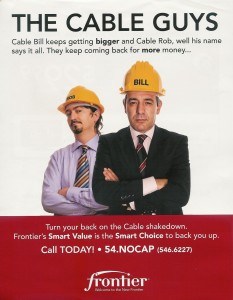
Beaumont, Texas
Stop the Cap! reader Mark who went to war with Time Warner Cable in the Beaumont area when they tried to impose Internet Overcharges on his account (and got his money back), found himself back with AT&T after dropping Time Warner Cable. Mark is among many who made it clear that imposing these kinds of billing schemes is not up for discussion — he will cancel service immediately.
Before Mark returned to AT&T, he called the company’s customer service sales center and asked about usage limits and other pricing tricks and traps, and they responded, “there are no cap limits.” That’s because for most of AT&T’s coverage area, that’s true… for now. The company has been testing Internet Overcharging with usage allowances and overlimit fees in two cities – Beaumont, Texas and Reno, Nevada. Unfortunately, not every AT&T sales representative seems aware of this fact, even when you provide them with an address and telephone number within the test area.
“We received the modem and before I had opened the package a certified letter arrived from AT&T,” Mark says.
“It was a letter stating that AT&T had introduced usage limits, and I called them immediately to cancel,” he said.
When you live in a city with two broadband providers, both engaged in Internet Overcharging, you discover you run out of options very quickly. Or do you?
“I called AT&T and talked to an upper level retention agent named Jennifer, and told her if I could not get a flat rate Internet plan from AT&T, I wanted to also cancel my two phone lines and my business Yellow Pages ads,” Mark said.
Even when providers claim to “listen to their customers” on issues like this, the one word they always truly understand is: CANCEL.
“Jennifer immediately agreed to note my account that there would be no usage overlimit charges, which effectively gave me flat rate service,” Mark said.
The AT&T representative also sent him a $75 gift card and promised to investigate getting him faster DSL service on the Elite tier he tried before, and failed to receive. To date, Mark hasn’t been billed one cent more than his standard monthly rate, despite AT&T’s ongoing “tests” in Beaumont. As long as that remains true, and AT&T works on getting him more reasonable speeds, Time Warner Cable has lost a customer, potentially for good.
Mark feels he’s living on the front line of a battle between consumers and providers over what is rapidly becoming a utility as important as telephone service.
“I feel the Internet is going to pass Americans by if something is not done,” Mark adds. “I personally will not pay the kind of fees the ISP’s want to charge.”
Mark is also curious why these “tests” are being imposed on residential customers, and not business customers who are charged prices providers claim are justified considering their “higher usage.”
“Starbucks and Books a Million all have Internet service from these companies and provide it to their customers,” Mark notes. “Were they exempt?”
Time Warner Cable’s testing, now suspended, never involved commercial accounts. AT&T doesn’t appear to have included their business accounts in any tests either.
If you are an AT&T customer in Beaumont or Reno, you may have a shot at exiting a test you never wanted to be a part of in the first place. Simply insist on either being exempted from Internet Overcharging schemes, or take your business elsewhere (Time Warner Cable in Beaumont, for now, may be your best option.) Retention specialists may be the only representatives empowered to exempt you, so you may have to indicate your intent to cancel service before reaching one.
If you are under a contract with an early termination fee, ask the competitor if they’d be willing to cover your exit fee. Time Warner Cable is doing that in some markets. If not in full, negotiate and see how far they’ll go.
Report any results of your efforts to us. We’ll pass the word on to others.


 Subscribe
Subscribe



 The NoChokePoints Coalition has a point. They are a coalition of public interest groups and providers like British Telecom and Sprint-Nextel that are upset with monopolistic pricing for high speed broadband lines. Verizon and AT&T “control the broadband lines of almost every business in the United States” the coalition states, and “generates a profit margin of more than 100% for the controlling phone companies.”
The NoChokePoints Coalition has a point. They are a coalition of public interest groups and providers like British Telecom and Sprint-Nextel that are upset with monopolistic pricing for high speed broadband lines. Verizon and AT&T “control the broadband lines of almost every business in the United States” the coalition states, and “generates a profit margin of more than 100% for the controlling phone companies.”